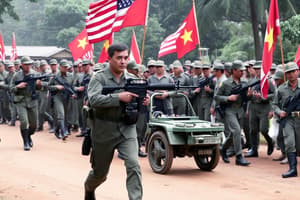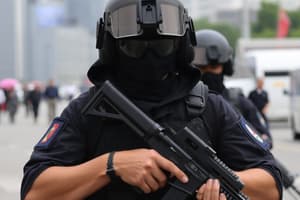Podcast
Questions and Answers
Which factor most significantly influenced US military strategy during the Vietnam War?
Which factor most significantly influenced US military strategy during the Vietnam War?
- A belief that the war would quickly end with superior technology
- Misunderstanding the motivations behind Vietnamese nationalism (correct)
- A strategy focused solely on economic assistance
- Desire to establish a military base in Southeast Asia
What was a key misconception held by Americans regarding the reasons for Vietnam's resistance?
What was a key misconception held by Americans regarding the reasons for Vietnam's resistance?
- The Vietnamese were primarily driven by Marxist ideologies (correct)
- The war was primarily about geographic expansion
- The local population preferred Western influence over communist ideals
- Vietnamese citizens had no strong ties to their land
What was the primary impact of the Vietnam War on US military personnel?
What was the primary impact of the Vietnam War on US military personnel?
- A significant number faced emotional traumas and physical disabilities (correct)
- Most returned home without any long-term consequences
- All soldiers received financial compensation for their service
- They experienced fame and recognition upon return
What was a direct long-term consequence of US involvement in Vietnam for the civilian population?
What was a direct long-term consequence of US involvement in Vietnam for the civilian population?
How did the perception of the ARVN (Army of the Republic of Vietnam) change after the war?
How did the perception of the ARVN (Army of the Republic of Vietnam) change after the war?
What was the eventual economic cost of the Vietnam War for the United States?
What was the eventual economic cost of the Vietnam War for the United States?
What was one of the significant impacts of the Tet Offensive on American soldiers' morale during the Vietnam War?
What was one of the significant impacts of the Tet Offensive on American soldiers' morale during the Vietnam War?
Which strategy did President Nixon advocate for during the Vietnam War?
Which strategy did President Nixon advocate for during the Vietnam War?
What did the phrase 'peace with honor' signify in relation to US involvement in Vietnam?
What did the phrase 'peace with honor' signify in relation to US involvement in Vietnam?
How did the image of Nguyen Van Lem's execution impact American perceptions of the Vietnam War?
How did the image of Nguyen Van Lem's execution impact American perceptions of the Vietnam War?
What was a major consequence of the high civilian casualties during the Vietnam War?
What was a major consequence of the high civilian casualties during the Vietnam War?
What was the significance of Ho Chi Minh's death in 1969 for Vietnam's reunification?
What was the significance of Ho Chi Minh's death in 1969 for Vietnam's reunification?
What did the term 'Vietnamization' imply in the context of US military strategy?
What did the term 'Vietnamization' imply in the context of US military strategy?
What were the implications of the term 'fragging' incidents during the Vietnam War?
What were the implications of the term 'fragging' incidents during the Vietnam War?
What was the main purpose of the Military Assistance Advisory Group (MAAG) in Vietnam?
What was the main purpose of the Military Assistance Advisory Group (MAAG) in Vietnam?
Which strategy illustrates the concept of 'Dollar Imperialism' in Vietnam?
Which strategy illustrates the concept of 'Dollar Imperialism' in Vietnam?
What was a significant consequence of the policies implemented by Diem in South Vietnam?
What was a significant consequence of the policies implemented by Diem in South Vietnam?
How did the American military strategy in Vietnam fail to learn from previous conflicts?
How did the American military strategy in Vietnam fail to learn from previous conflicts?
What role did American films play in the perception of the US presence in South Vietnam?
What role did American films play in the perception of the US presence in South Vietnam?
What was a long-term effect of the US involvement in Vietnam as inferred from the content?
What was a long-term effect of the US involvement in Vietnam as inferred from the content?
How did US reliance on the Army of the Republic of Vietnam (ARVN) affect military strategies?
How did US reliance on the Army of the Republic of Vietnam (ARVN) affect military strategies?
What was a major flaw in the American approach to nation-building in South Vietnam?
What was a major flaw in the American approach to nation-building in South Vietnam?
Flashcards are hidden until you start studying
Study Notes
Eisenhower Administration and the Domino Theory
- America’s engagement in Vietnam commenced secretly and culminated in a 30-year failure.
- Military Assistance Advisory Group (MAAG) established to train anti-communist forces, with over 15,000 US advisers in South Vietnam by 1963 including operations in Cambodia.
- By 1965, millions allocated to develop South Vietnam's military, economy, and political structures to foster loyalty to the South Vietnamese government.
Non-Direct Involvement: Cultural and Economic Perspectives
- Anti-Communism propagated through "Dollar Imperialism," promoting capitalist values but critiqued for superficial cultural imposition (Coca-colanisation).
- Approximately 60 American films were shown in South Vietnam by 1958, influencing societal views; events like "Democracy in Action" attracted significant participation.
- Failed nation-building policies under Diem exacerbated rich-poor divides and hindered propaganda efforts.
Military Dynamics: ARVN and US Forces
- Army of the Republic of Vietnam (ARVN) trained by MAAG; supported by the US Marines and Air Force.
- The US aimed to build a conventional military force despite guerrilla tactics' effectiveness and learnt little from French military failure.
- Civilian resentment grew amidst foreign intervention, with sentiments labeling foreigners as invaders.
Challenges to US Military Strategy
- US officials, including McNamara, recognized underestimating Vietnamese nationalism which motivated their resistance against foreign military presence.
- Vietnamese forces, contrary to US assumptions, fought for national pride rather than ideology.
Final Collapse of South Vietnam
- By 1974, US aid reduced sharply, leading to dependency on continued American military presence.
- On 3 April 1975, the US began evacuating civilians from Saigon, which ultimately fell to North Vietnamese forces on 1 May.
Costs of the War for the US
- The Vietnam War incurred a financial cost of approximately $250 billion.
- The conflict resulted in 58,126 American military deaths and left around 200,000 with permanent disabilities.
- Amidst ongoing compensation efforts, $22 billion were allocated yearly to Vietnam veterans.
Impact on South Vietnam and Asian Migration
- Post-war, South Vietnam was renamed Ho Chi Minh City in July 1976.
- By August 1979, approximately 675,000 South Vietnamese fled to countries like Malaysia and Thailand, with many achieving asylum in Western nations.
Psychological Impact on American Soldiers
- Growing war weariness emerged, highlighted by popular anti-war sentiments and impacting soldiers’ morale during gradual troop withdrawal.
- Lack of military objectives led to fragmentation incidents within troops, recording 900 cases from 1969 to 1972.
Home Front and Public Sentiment
- Disillusionment peaked following the Tet Offensive; LBJ’s withdrawal from the 1968 election highlighted political tensions.
- Anti-war activism escalated, notably illustrated by iconic photographs depicting the harsh realities inflicted on Vietnamese civilians.
Civilian Casualties and Consequences
- More than three million Vietnamese civilians perished during the conflict, significantly undermining South Vietnam's morale and hope for victory.
- American intervention viewed as an unwanted presence, leading to widespread destruction and disruption within Vietnam.
Studying That Suits You
Use AI to generate personalized quizzes and flashcards to suit your learning preferences.




